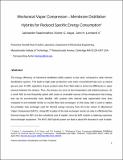Mechanical vapor compressio--Membrane distillation hybrids for reduced specific energy consumption
Author(s)
Swaminathan, Jaichander; Nayar, Kishor Govind; Lienhard, John H
DownloadMVC-MD-hybrids-DSPACE.pdf (861.0Kb)
OPEN_ACCESS_POLICY
Open Access Policy
Creative Commons Attribution-Noncommercial-Share Alike
Terms of use
Metadata
Show full item recordAbstract
The energy efficiency of membrane distillation (MD) systems is low when compared to other thermal desalination systems. This leads to high water production costs when conventional fuels such as natural gas are used. In MD, separation of pure product water from feedwater is driven by differences in vapor pressure between the streams. Thus, the process can occur at low temperature and ambient pressure. As a result, MD is most frequently paired with waste or renewable sources of low temperature heat energy that can be economically more feasible. MD systems with internal heat regeneration have been compared to and modeled similar to counter-flow heat exchangers. In this study, MD is used to replace the preheater heat exchanger used for thermal energy recovery from the brine stream in mechanical vapor compression (MVC). Using MD in place of the heat exchanger results not only in effectively free thermal energy for MD, but also subsidized cost of capital, since the MD module is replacing expensive heat exchanger equipment. The MVC–MD hybrid system can lead to about 6% decrease in cost of water, compared to a stand-alone MVC system. The savings increase with: an increase in MVC operating temperature, a decrease in MVC recovery ratio, and with a decrease in MD capital cost. The conductive gap configuration of MD leads to maximum savings, followed by air gap and permeate gap systems, over a range of operating conditions, assuming equal specific cost of capital for these configurations.
Date issued
2016-04Department
Massachusetts Institute of Technology. Department of Mechanical Engineering; Rohsenow Kendall Heat Transfer Laboratory (Massachusetts Institute of Technology)Journal
Desalination and Water Treatment
Publisher
Taylor & Francis
Citation
Swaminathan, Jaichander, Kishor G. Nayar, and John H. Lienhard V. “Mechanical Vapor compressio--Membrane Distillation Hybrids for Reduced Specific Energy Consumption.” Desalination and Water Treatment 57, no. 55 (April 28, 2016): 26507-26517.
Version: Author's final manuscript
ISSN
1944-3994
1944-3986